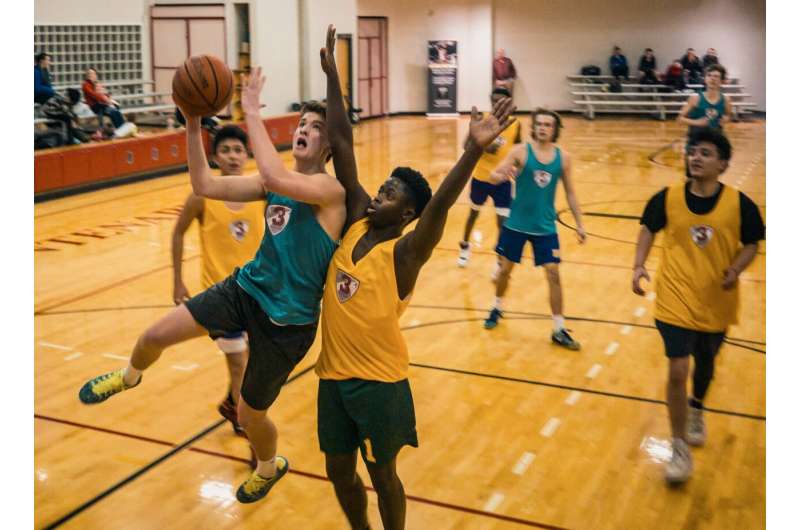This article has been reviewed according to Science X's editorial process and policies. Editors have highlighted the following attributes while ensuring the content's credibility:
fact-checked
trusted source
proofread
Playing youth sports is linked to better mental health in adults

Adults who continuously played organized sports through their youth have fewer symptoms of anxiety and depression than those who never played or those who dropped out, a new study finds.
Those who dropped out of sports had poorer mental health than those who never played at all.
But many more people drop out of youth sports than play continuously until they are 18, said Chris Knoester, senior author of the study and professor of sociology at The Ohio State University.
"If you play and stick with sports, it's a positive for your mental health, but if you play and drop out it seems to be negative—and most kids drop out," Knoester said.
The study, published in the Sociology of Sport Journal, showed that most people dropped out of sports because they weren't having fun or felt they weren't good enough. That suggests ways youth sports can be improved to help kids, said study lead author Laura Upenieks, assistant professor of sociology at Baylor University.
"Our findings about why kids drop out of organized sports suggests that the current environment is less than ideal for everyone, and that the barriers to participation need to be given greater attention," Upenieks said.
The study used data from the National Sports and Society Survey, conducted in 2018 and 2019 by Ohio State. It included a sample of 3,931 adults from across the country who answered questions about their sports participation as children and their current anxiety and depression symptoms.
Results showed that 35% of the participants had not played organized sports at all, 41% had participated and dropped out, and 24% had participated continuously until age 18.
Those who participated in organized sports continuously while growing up reported lower depressive symptoms and symptoms of anxiety than others.
Those who dropped out had the worst mental health profile, with those who never played in the middle.
Knoester emphasized that most participants didn't have clinical levels of depression or anxiety, and the differences among the three groups were relatively modest. But the differences still mattered.
By far the most common reason cited for dropping out was "not having fun," which nearly half of respondents (45%) identified. The next most common reason was feeling like they were not a good player (31%). Other reasons for dropping out were wanting to focus on grades (16%), having a health problem or injury (16%), not being able to afford sports (16%), having an issue with team members (15%) and having an interest in other clubs and activities (14%).
Notably, 8% said they dropped out because they had been abused by a coach.
While dropping out of sports was associated with poorer mental health, "not all reasons for dropping out had the same effects," Upenieks said.
Interpersonal reasons for dropping out—including not having fun, not getting along with team members and being abused by a coach—were associated with adult depressive and anxiety symptoms.
Those who couldn't afford sports and sporting equipment also showed poorer mental health. But those who dropped out in order to focus on grades actually showed lower depressive symptoms, the study found.
"Prioritizing education predicts better mental health as an adult," Knoester said.
Many previous studies have focused on the impact of playing sports—or not playing—on adult outcomes. But this study is one of the first to look at what happens when youth quit sports, Knoester said, and it shows that persistence in playing is an important issue.
"Unfortunately, it is not a simple story of playing sports is good for kids," he said. "It is complicated by whether kids stick to playing sports and the reasons why they do stick to it or quit."
It is easy to see why sports can be good for those who are able to continue with it to adulthood, Upenieks said.
"The longer that youth are exposed to a positive and encouraging sporting environment, the more likely they are to develop habits that are conducive to long-term mental well-being, such as a commitment to regular exercise and collaborating with others as part of a team," she said.
The fact that so many kids quit shows that organized sports often don't provide a positive environment. But there are steps adults can take to improve that environment.
For one, sports should be safe for kids. The fact that 8% said they were abused by coaches is particularly alarming, the researchers said.
And the finding that nearly half of kids quit because they weren't having fun and about a third dropped out because they felt they weren't good enough should also be a wake-up call, Knoester said.
"We need to improve youth sports so that it supports positive experiences for everyone and makes it more enjoyable," he said.
While winning is part of sports, it may be that adults overemphasize that aspect and ruin the experience for many young people.
"Most kids are looking to have fun with their friends and support and encourage each other," Upenieks said. "It doesn't have to be all serious."
Knoester added, "Our results suggest that by taking away the fun and making kids feel they aren't good enough, there could be cascading effects in terms of hurting self-esteem and confidence that could reverberate through to adulthood."
More information: Laura Upenieks et al, Better to Have Played Than Not Played? Childhood Sport Participation, Dropout Frequencies and Reasons, and Mental Health in Adulthood, Sociology of Sport Journal (2024). DOI: 10.1123/ssj.2023-0165




















